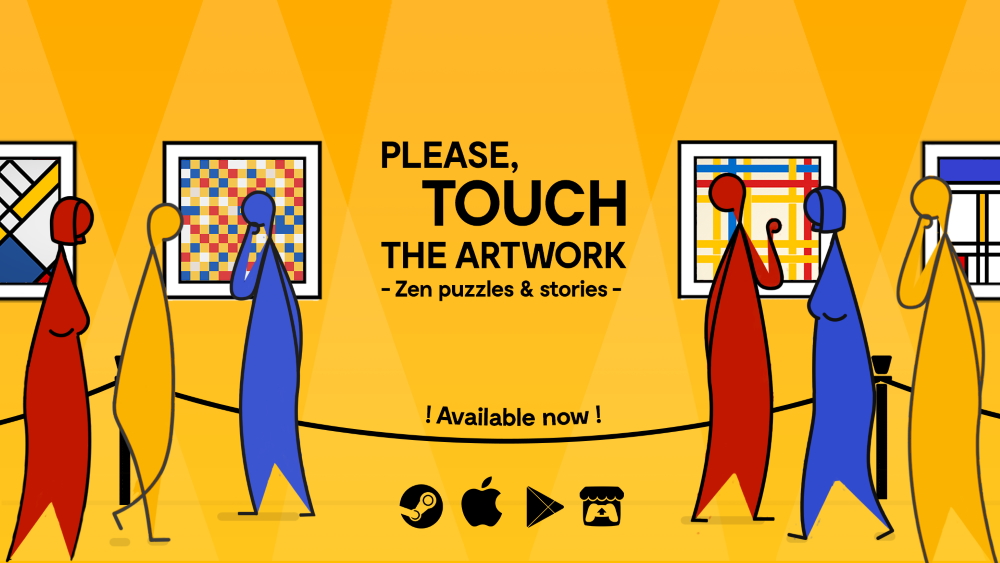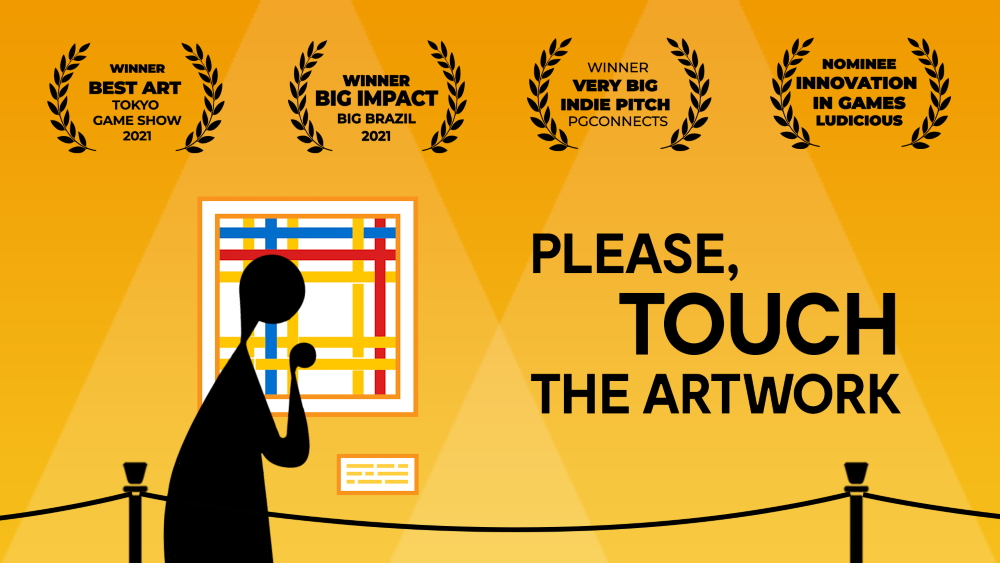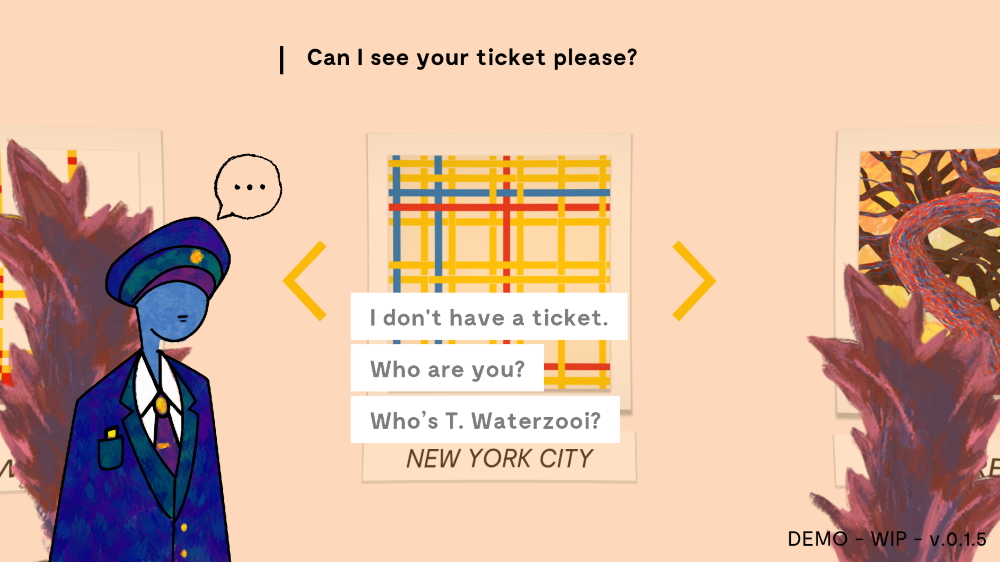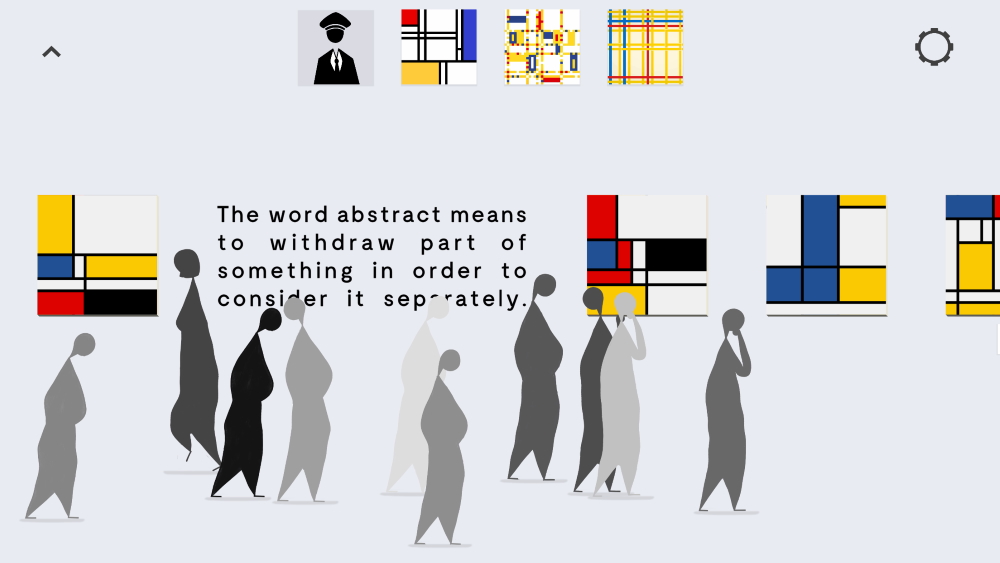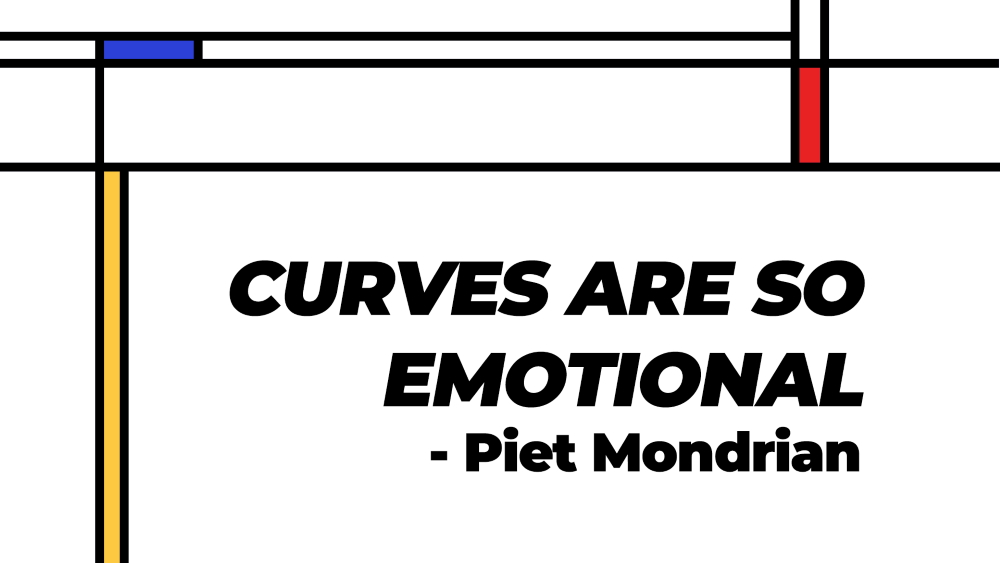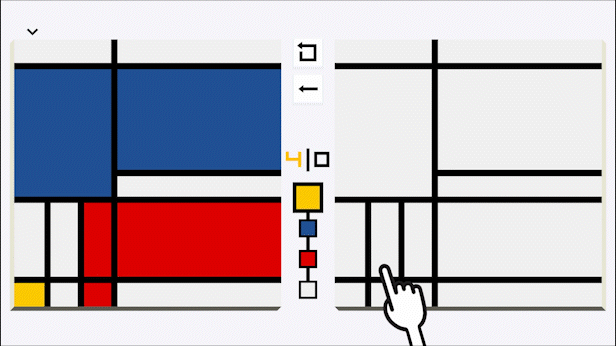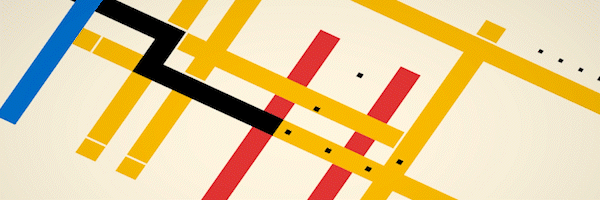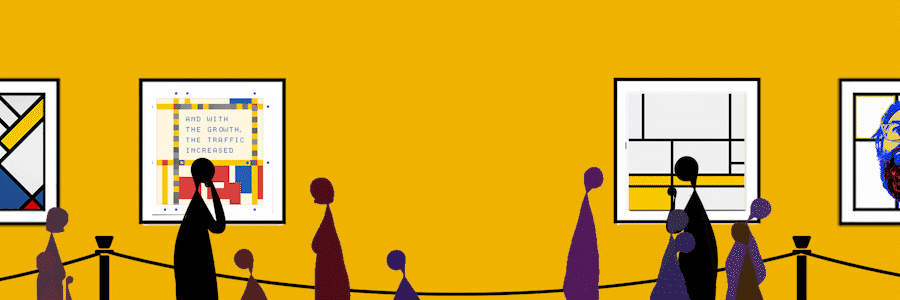Thomas Waterzooi
game designer
Belgium
Winner 'Best Art' (Tokyo Game Show). Winner ‚Best Educational‘ (Big Brazil). These awards plus various international nominations like Top 20 of Best Games of 2022 (The Guardian, Eurogamer) and „Apple Design Award“ finalist (category „fun & delight“) went to „Please, Touch The Artwork“. In it developer Thomas Waterzooi turns classic abstract paintings from an artist like Mondrian into a set of zen-puzzling, story-rich artful games and experiences. During an aesthetic journey (featuring a soothing jazzy soundtrack) the user explores the secret world behind iconic art. Because of its approach this game is „one for all the chaotic gallery enthusiasts out there“ (The Gamer) and surely for an audience that normally isn‘t interested in playing video/computer games at all!
Thomas Waterzooi
game designer
Belgium
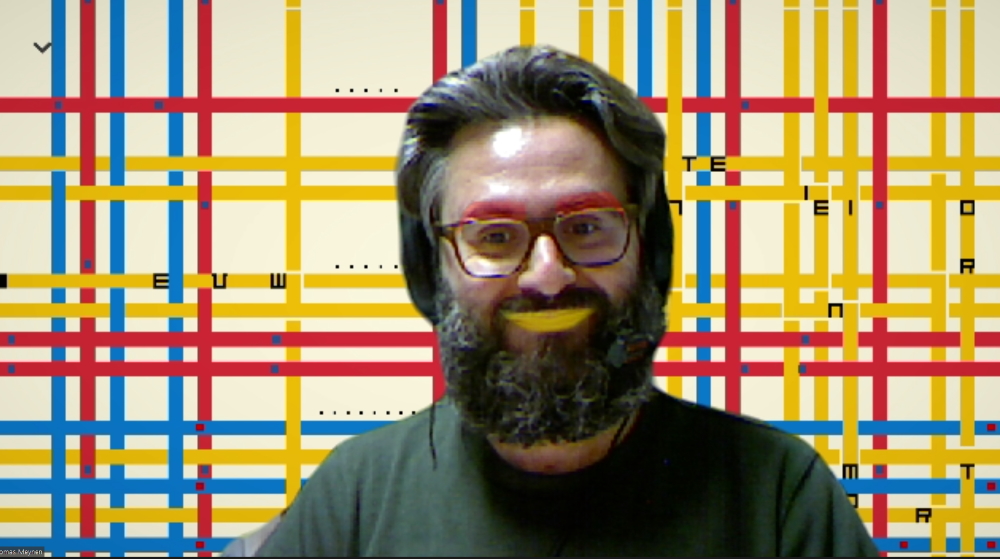
Making accessible interactive stories and playful things inspired by art, culture, society and human interest – this is what Thomas Waterzooi (* April 1986, Gent) focuses on. His games are not about skills or high-scores. They are about relaxing, reflecting, playful tinkering, and being sucked into the story and aesthetics (nowadays also often referred to as "wholesome"). Therefore the Belgian was inspired by the manifesto ‚Rejecta‘ by the Italian game designer Pietro Righi Riva. It aims to provide guidelines to develop games for a new audience - people that usually are not found of video games but have other interests such as art, culture, humanity. At best these new games can eventually become the art-form the medium deserves to be.
The inspiration for „Please Touch The Artwork“ came to Thomas Waterzooi, who had previously worked in two studios as gameplay and AI developer before going solo on December 26th, 2017, while reading a book called ‘What Are You Looking At’ by Will Gompertz. In Dutch (his mother tongue) the title was changed and it freely translates to ‘My little sister can do this as well. Why modern art is art.’ Thomas has a technical background but very artistical parents. He's always had a complex relation with modern art so this title triggered him. It’s an anecdotal and informative book which sketches the chronology of the origins of modern art - from the impressionists to the present. You go on a journey and read about where these artists lived and worked, who their friends were and what drove them to make their art. It was the period after postimpressionisme - the time of cubism, suprematism, the style - that attracted Thomas the most. During a night of light insomnia Thomas wanted to try writing a Mondrian-painting generator which randomly generated paintings in Mondrian's famous ‚Composition with Red, Blue and Yellow‘ style. He thought it would be nice if the user could manipulate the paintings as a way of ‘becoming the artist’. A little puzzle mechanic was added so that each player (no skills required!) would have a unique copy of the game and ‘Please, Touch The Artwork’ was born.
As the title suggests: Here one is in contrast to a visit at the museum allowed to touch the otherwise untouchable artwork!
Besides Thomas Waterzooi has, in collaboration with some European universities, developed and designed ‚BabelAR‘. The Virtual Language App’s goal is to welcome multilingualism in school classes, show pupils (age 7-12) the value of the language(s) they possess and to activate their language knowledge. It is an innovative multididactic approach which teachers can use in the classrooms. The collaborative game can be played in fourteen languages.
Heer Waterzooi lives and works in Gent/Brussels.
Interview July 2022
Great challenge: developing (aesthetic) computer games for people who normally aren’t interested in „gambling“
INTUITION/IMAGINATION
How does intuition present itself to you – in form of a suspicious impression, a spontaneous visualisation or whatever - maybe in dreams?
For me intuition is not a thing I control. It’s that gut feeling you get when you’re (not) satisfied with your design, or when someone gives you suggestions for your work and you don’t agree just because you know your idea is better. It can occur when you revise some work you did a couple of weeks before and immediately know if it’s good or bad. Often we ignore our intuition, because we feel pressured by society’s norms and opinions, but in the end that’s the same as lying to yourself.
Will any ideas be written down immediately and archived?
I’m very bad at documenting and archiving stuff, this is partly because I work alone. I follow this guideline where I believe that really good ideas will reappear in my mind, even if I briefly forget about them. If the idea pops up again you know your subconsciousness wants you to investigate it further. I do use Trello once in a while for smaller reminders or when I want to break down an idea into features.
Are great ideas based on intuition or by almost endless trials and errors that result in constant developments up until the final result?
For me it’s more the second one. An idea can be fun in your head (or on paper) but not work once you start implementing it. Especially during conversations with your friends you have a lot of these ‘oh, wouldn’t it be nice if you could do this and this in the game?’-ideas, but 90% of the time these ideas will not work, are too big to implement, or are just too gimmicky and don’t really add that much to the core idea of the game. I start from the visual and hope it will inspire me. Only by implementing something will I get new ideas. So endless trials and errors it is.
What if there is a deadline, but no intuition? Does the first fuel the latter maybe?
Great question! I definitely need more deadlines, else I slack too much or iterate too long on stuff. You could argue this is what makes the product better (the fact that there is lots of time to iterate), but I also believe in the power of deadline’s for quick decision making. A deadline will not necessarily give you more/better ideas and results, but it will make you drop the stuff that doesn’t matter faster.
INSPIRATION
What inspires you and how do you stimulate this special form of imaginativeness?
The little things in everyday life. I personally love the little quirks in human/social behaviour that you don’t pay a lot of attention to but that are really funny. Seinfeld, ‘the show about nothing’, is a big inspiration. It’s about nothing in particular but everything at the same time. It’s the ‘did you ever notice…?’ question that I find the most interesting.
For example the story in the first gallery of ‘Please, Touch The Artwork’ was inspired by an anecdote from art-history not a lot of people know about. It is said that art-movement ‘The Style’-founders Mondrian and Van Doesburgh had a quarrel about introducing diagonals in their paintings. Mondrian was absolutely against this and only allowed horizontal and vertical lines. I find it exceptional (and at the same time very human) how something this trivial could turn into a big fight that eventually led to their split and the art-movement falling apart.
How do you separate the good from the bad and which ideas are worthwhile to be explored further or whether one idea has the potential of being outstanding really?
This is a combo of the things previously mentioned:
- a good idea will pop-up again, even if you don’t write it down, it grows on you
- after prototyping something, I let it rest for a week. When I revise it I trust my first impression to see if I still like it
- gathering feedback from others that might confirm a feeling I already had
- always think: does this idea add to the core-idea of what my game is about or is it just a funny gimmick, or an extra that the game could live without.
Has it to appeal to you primarily or is its commercial potential an essential factor?
I try to explore the borders between something that’s artistically original and something that’s commercially viable. I’m not going to completely ignore my users' feedback just for the sake of making something I like. In that sense I might not be a ‘true artist’.
I want to make games for a ‘new audience’. These are people that have many interests (art, culture, society, human interest) but don’t necessarily see these interests reflected in games. This means you have to think commercially and see what these people like in other media (like books/television/lifestyle/musea) and try to translate this to games.
Do you revisit old ideas or check what colleagues/competitors are up to at times?
I have a little google doc with some small ideas written down. I don’t check them that often though haha. Again, I trust that a good idea will pop-up again when it’s ready to be developed further. I don’t game that much anymore and if I do it’s usually indie titles that are trying to do something different. I sometimes think ‘ah that’s a genius idea, it’s so simple, why didn’t I come up with that?!’ but then immediately I think ‘ah, it wouldn’t really be the thing I would be passionate about making anyway’. Scrolling on Twitter and seeing all these great games out there might make you feel powerless and give up even before you start so one of the few things you need is to really believe your idea is unique, else you won’t persevere.
CREATIVITY
Which time/place/environment suits your creative work process the best (tranquillity or pressure) and which path do you take from theory/idea to creation?
I’m the most creative at night. It comforts me to think that everyone is sleeping and the world stops rushing for a couple of hours (this is an illusion of course, I know the world never stops). It’s the twilight zone where everything is possible. I work at a coworking space and there is a lot of ambience during the day which doesn’t always allow one to fully concentrate. However, talking with peers to discuss ideas and motivate each other is essential as well so I don’t mind if I have to sacrifice a bit of concentration in return. I work best when I have a deadline, else I can keep polishing something forever. However, I sometimes wonder if it’s this polishing that makes my work stand out in the first place. Maybe deadlines just make you choose faster. And polishing creates more choices.
What is better in the realization process: speed and force creativity i.e. grasp the magic of the moment, or a slow, ripening process for implementation/elaboration?
I have the luxury to not force creativity so I usually take things slow. I’m not the kind of creator that has a clear idea of where they want to go yet (I’ve always been jealous of people that know exactly what they want to do/make). I start from a feeling or a visual. This approach requires me to try stuff out and I usually get new ideas when I’m implementing things. So it’s definitely a slow process that’s probably hell for a project manager to scope.
If problems occur during creativity or one’s stuck even, how can these be solved?
It’s a bit of cliché but: put your work down, go out and do something else. I’ve read somewhere that when you can’t remember something pretty straightforward it’s because the neurologic path to a certain memory is ‘overtriggered’. You can try to ‘unblock’ that part of your brain by doing a simple maths sequence. This uses a different area of the brain and so the other neurons can relax again. I guess for creativity it’s similar, just focus on something else, recharge, and fire away at it again!
How important are self-doubt and criticism (by others) during such a process i.e. is it better to be creative on your own, only trust your own instincts, or in a team?
I feel like the difference between games and other media is that you have to focus way more on user experience. This experience might potentially be different for everybody. Hence the user’s feedback is invaluable, whether it’s from a professional game developer testing your game or one of your clients. We should overcome our fears and show our product as soon as possible, only by doing this you can tackle issues from the very beginning. Of course, don’t take all feedback as things you definitely have to address. Use your intuition to distinguish between things that are bad user experience and things that the user just doesn’t like because of personal taste. I’ve never worked in a team but I imagine you always need one person taking the final decisions (some kind of director), even if the rest of the team can give as many suggestions as they want. I guess a good director can get everyone on the same page and point in the same direction.
Should a creative always remain true to him-/herself including taking risks & going against the flow or must one, for reasons of (commercial) survival, make concessions to the demands of the market, the wishes of clients and the audience’s expectations?
I guess both. Expectations are a funny beast. Everyone thinks in boxes and genres. I would be a hypocrite if I said I didn’t. When I browse Netflix and watch a short preview of a show, I subconsciously compare this to things I know and decide whether I might like it or not (or if I am in the mood for this experience). Something that’s too new/too different might scare people off, but I think it’s a challenge to look for the frontiers of innovation while being relatable. In games especially, I feel we can still borrow a lot of things from other media (mainly film) to make innovative experiences that still feel new enough, because the medium is still ‘young’. Especially in the realms of narrative.
How is innovation still possible if one has established a distinctive style and, just in case, is it good to be ahead of one’s time even one hazards not being understood?
We don’t have to innovate all the time. Your distinctive style is your innovation, and as long as it is recognizable from other mass products you’re still innovative ‘enough’. But it depends on what your goal is: to sell products or to create something you just want to create for the sake of expression. Something can be very experimental and be liked by a certain niche of people you relate to, which might give you enough satisfaction as a developer. The nice thing is niches nowadays can potentially be commercially viable simply because there are more people in the world that can be reached and so in absolute numbers your niche can still be ‘big enough’.
When does the time come to end the creative process, to be content and set the final result free - or is it work-in-progress with an endless possibility of improvement?
Haha, impossible question. You can keep polishing forever indeed but at a certain point you have to let go and give your game to the public. I think you just need to be satisfied with the base yourself and then the players will fill in the gaps. You’ll get a lot more player feedback, bug reports, good reviews, bad reviews which will make it clearer where there’s improvement necessary. Games (or software in general) are a great medium in that sense, because they can keep being improved after release. It’s not like the production ‘ends’, it’s actually a second phase that starts (which includes keeping your game alive and noticeable marketing wise). For my next game I want to experiment with having the release as soon as possible, and maybe build the game together with the community (e.g. early access). They say this works less for narrative driven games because you might already spoil the plot but I still want to try.
In case of failure or - worse - a creativity crisis how do you get out of such a hole?
Even the strongest personalities will fall in some kind of ‘black hole’ after release or when the buzz is over. Even if the game was a critical success. It’s merely the exhaustion of working on a project for several years that has its impact. I can only imagine that this is ten times worse when the project is a failure. I guess it’s the same like a lot of things in life: failing is essential, but how many times can you fail before you should consider taking a different profession? No answer here sorry, you’ll just have to keep going and keep looking for the thing that sparks you again.
SUCCESS
Should/can one resist the temptation to recycle a ‘formula’ one’s successful with?
I’ve learned by now that to have full creative freedom, you kind of need financial freedom. To get this financial freedom and sustain a studio you have to think a bit commercial. This might include recycling a formula or expanding on an existing IP (intellectual property) that worked before. This is nothing more than brand-building and is nothing to be ashamed of. It creates identity (as long as you are the original creator of the brand/IP of course), and allows people to recognize your work.
Is it desirable to create the ultimate/timeless work, but doesn’t “top of the ladder” bring up the question of “what’s next?” i.e. isn’t such a personal peak “the end”?
Every success (or failure) in life brings up the question ‘what’s next?’. The mistake we make is that the ‘next’ has to be somehow ‘better’ than the current. If you feel you’ve done everything within a certain medium, then just change the medium and start again (sometimes at the bottom of the ladder yes), or change the genre of things you make, or tackle a skill within the medium you haven’t done before (e.g. go from 2D to 3D). There’s too much to learn in this world for one lifetime. On the other hand we should allow ourselves to be bored and do absolutely nothing once in a while as well.
MY FAVORITE WORK:
I’ve been in the industry for a while but I’ve only released one fully independent solo developed title so far: ‚Please, Touch The Artwork‘, a relaxing puzzle game where you explore the worlds behind iconic abstract paintings by touching them. It is exactly the fact that I was able to self-publish an award winning experience, all by myself from start to end, that I’m the most proud of. It took me a couple of years and lots of grey hairs but I’d do it all over again immediately! It got picked up by Apple (Apple Design Award finalist), and was listed by both The Guardian and Eurogamer in the top 20 games in 2022 so far. It’s exactly the kind of games I see myself making more of in the future: short, sweet, cozy experiences about culture, art and society.
